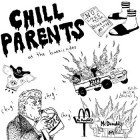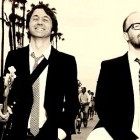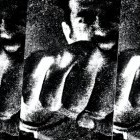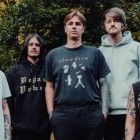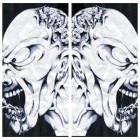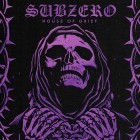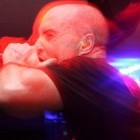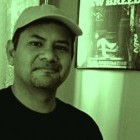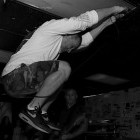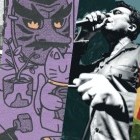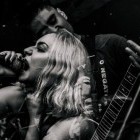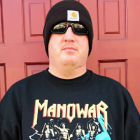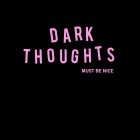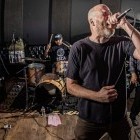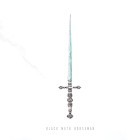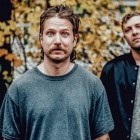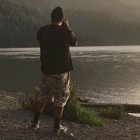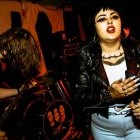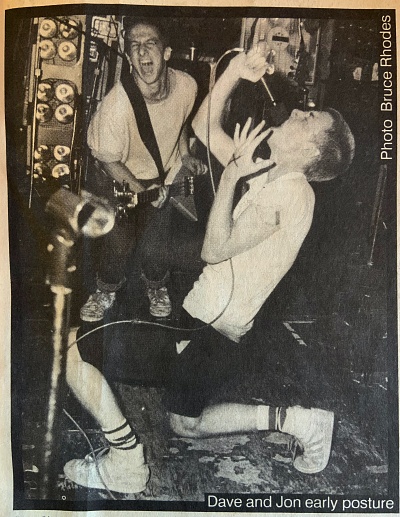
Jonathan Anastas is the bass player and one of the songwriters from Boston’s own DYS. A founding father of Boston hardcore, he and DYS are still active and will hopefully be back on live stages soon.
In this interview we discuss all-things Boston and DYS. You wanna know some of the roots of the Boston/NYC rivalry (No, not the Red Sox and Yankees!)? Well, read on!

You are Jonathan Anastas, bass player from Boston’s own DYS, correct?
Correct.
Are you actually from Boston?
Born and raised in the suburbs of Boston. Gloucester, and Marblehead. Spent my teenage years in Cambridge. Lived in Boston proper for a time during DYS and Slapshot and then moved back to Marblehead, moved to New York, moved to LA, moved to San Francisco, moved back to LA.
What kind of music were you listening to before you discovered punk and hardcore?
My first, sort of, I wanna be a musician moment was Aerosmith and like a lot of Boston kids I thought, if I could be as cool as Joe Perry there probably wasn’t a better pinnacle on earth than that. I went through the Aerosmith arc and like a lot of younger kids who ended up liking heavy music, KISS was a big early influence.
I remember when I was in grammar school, I don’t even know how he ended up with these things but Ben Carr’s father, Ben Carr from the Mighty Bosstones, the Carrs and the Anastases went to grammar school together and Ben Carr’s father looked like this big Hell’s Angels guy and he fixed motorcycles for a living, Jack Carr. He was like coolest dude, like I wished my dad could be as cool as Jack Carr.
I don’t know how he got it but at some point when I was 8 or 9 Jack Carr gave me a bridge off Paul Stanley’s guitar and an Ace Frehley guitar pick. Again, no idea how he got his hands on those things but I was in absolute heaven as a 9 year old.
How did you decide to play bass and get into a band?
I think like a lot of kids I don’t think I started as wanting to play punk per se, I just wanted to play music. Again, if you could’ve waved a magic wand I would’ve been Joe Perry but I don’t know, maybe for my 13th birthday I asked for musical gear and you know, we were very middle class growing up, I didn’t want for anything but my parents weren’t gonna go out and get me a Marshall stack and a Les Paul when I’m 13.
It’s not like you were Brian Baker or Lyle Preslar or something!
[Laughs] So I think we went to some used music store in Cambridge and we bought a used Precision bass copy and a Peavy solid state amplifier and I tried to teach myself how to play KISS songs and how to play Aerosmith songs. It was like an utter and complete failure. My musical tastes were progressing and changing at the time and I started listening to things like the Ramones, the Clash and the Sex Pistols.
I had some friends in high school and we’d go down in my parent’s basement and try to figure out how to play things and you know, I wasn’t gonna be able to figure out how to play "Seasons of Wither" on my own but I could play Ramones songs after a couple afternoons in the basement. So it sort of started from there. It was kind of like what you could play as opposed to what you wanted to play. That doesn’t mean I didn’t like punk rock, of course I loved punk rock but if I’d had a more natural musical gift it might’ve gone in another direction early.
Since there was obviously no internet back then I always like to ask people, how and when did you first hear about punk and hardcore?
I was in summer camp, I went to sleepaway summer camp in Maine with a whole bunch of kids who all lived in Manhattan and in hindsight seemed to be a whole lot more sophisticated than us kids from Massachusetts. Kids who were sort of contemporaries of the Beastie Boys, kids who grew up on the Upper West Side and were going out all night when they were 12 or 13 years old. Sort of pre-internet where you really did know more living in New York than when you were living in Boston.
Now, the internet’s sort of the great equalizer, like everybody pretty much knows the same stuff but I don’t think everybody knew the same stuff then. Some kid had a copy of Creem magazine and it was like their first issue where it was the special punk issue so they covered the Top 20 Punk Bands. I just devoured that thing the entire summer.
So you just discovered it yourself then, you didn’t have any older brothers or sisters who turned you onto it?
Yeah. Well I mean these kids obviously showed up knowing something about it. So those few years in summer camp the Emerson, Lake & Palmer cassettes started going away and the Ramones cassettes started showing up but it all came as sort of a flow through these kids in New York. These kids who were sort of growing up around it.
There probably wasn’t really a punk scene anywhere in America except in New York and LA at that time. Then, back in Boston, I got a high school internship working at Newbury Comics and that continued the explosive growth pattern.
So that’s actually fairly ironic then that New York sort of informed early Boston hardcore, given the later so-called rivalry between the two cities.
It did. I mean, that was my journey, I think other people’s journey was different. I think you’ve probably read a lot about, I mean the first Black Flag show in Boston, which I missed because I was actually away at this summer camp, sort of triggered a big piece of the scene and then you’re in the Boston not LA irony but yeah, I think depending on whether you saw the Ramones first or Black Flag first is where your spark could’ve come from. And things really could’ve been sparked from a single show back then.
Like I said before, you sort of say SS Decontrol wouldn’t have existed without that first Black Flag show at the Paradise and then potentially half of the Boston hardcore scene’s move to metal wouldn’t have happened without that first Metallica show at the Rat. It was that transformational and single shows or single bands could be that transformational at that time.
Was Decadence your first band? And was “Slam” the first song you wrote?
Yes (Decadence was his first band), but "Slam" was not the first song I ever wrote. I can’t remember what order it was but we probably recorded 4 or 5 songs for that This Is Boston Not, L.A. compilation but that was the only one that made the cut. The Newbury Comics guys were deciding what was good enough and what was bad enough and I think it it was too early for us to understand the sort of schtickiness of it.
It was sort of weird, it ended up kind of being like a meme before memes existed. I think we were too young and unsophisticated to figure it out. It was sort of written as a joke but then not taken as a joke.
I was wondering about that, was that song an ode to slam dancing or a comment on boneheads in the pit or what?
It was kind of a funny joke song ode to slam dancing. Lines that sounded funny like, “Rip your 'Rock Lobster' shirt” was intended to be funny. But again, I don’t think we really figured out or like intended to do what we intended to do with it. That song was the only song on that record that ended up being an MTV Christmas promo for 15 years. And it’s arguably the most covered song on that record.
Did MTV pay you for having the song in that Santa Claus slam dancer interstitial thing? And how’d that happen anyway?
They never asked. I’m sure they didn’t know where to find us at that time. I actually had somebody go back and collect for us years later. Not like it was any huge shake, it was like a cable TV synch license, like nobody got rich off it but again that thing ran for years and years and you add up 12 annual synch licenses or whatever and it wasn’t life changing but you know, it probably generated a lot of revenue compared to any other hardcore song at that time.
It was funny, like the line with the "Rock Lobster "shirt, I was on the varsity wrestling team and I was into hardcore by that time and nobody really understood punk so I would get derided by the other team and the other team’s fans. They’d be be like, “Rock Lobster!” [laughs]. You know, they just couldn’t figure it out, it didn’t make a difference right? Because that’s all they knew. I’d either hear, “Whip it!” or “Rock Lobster!” when I’d come out to wrestle.
Did Decadence play any shows?
I recall one. I can’t promise you there wasn’t more than one but I remember one at a church in Cambridge.
How did you guys end up on the This Is Boston, Not L.A. comp, was it from your internship?
I was working at Newbury Comics but it wasn’t like I got any special treatment. Again, we recorded five songs and only one ended up on there. But they were like, “Record something and we’ll see.” and they told us about Radio Beat (recording studio), I didn’t know about that so they sort of helped me to know where to go and all that stuff.
Do you remember anything from the recording sessions?
It was my first time in a recording studio, I just showed up and hung on by my fingernails and tried to figure out how to not screw the whole thing up. Even though he became sort of a famous producer, Lou Giordano (engineer on the session) was probably just sort of getting his ski legs on at that time too. He wasn’t that many records into it yet, I don’t think anybody was that many records into yet.
Brian Baker tells a funny story, I think in the American Hardcore movie about recording at that time. He was like, “Nobody was sitting there in those studios going, ‘Can you get behind that beat a little bit…’ Or like, ‘Whoa that was really in the pocket!’ And it’s totally true! I swear the bar at that time, even through the Brotherhood session was like, “Did we get through it without fucking up?”
I don’t think anyone in those studios actually knew how to approach recording hardcore either.
I mean yes and no. Lou ended up being very good at what he was doing but the analog I’ll make is I think the Clash’s Give ‘em Enough Rope is their best-sounding Clash record for their punk records. Why? Because it was Sandy Pearlman who knew how to record Blue Öyster Cult. And I think it’s the only Clash record where it actually sounds like Mick Jones is playing a Les Paul Custom. So, we didn’t necessarily have access to the Sandy Pearlmans of the world.
I remember it was a big deal when Ric Ocasek (The Cars) produced the Bad Brains. The big huge debate about whether that’s a good sounding or a bad-sounding record. Even if you think about the way hardcore bands record records now. I remember talking to Craig Silverman (Only Living Witness, Agnostic Front, American War Machine, Slapshot) about the last Agnostic Front record and you see pictures from the studio and he’s got a Marshall 2203 and he’s got a Mesa and an Eddie Van Halen amp and he’s got like 15 different heads for different songs. Even hardcore records get recorded that way now.
When DYS went back and did our reunion stuff, I mean the irony is we all needed up with pretty good guitars back then because what are considered great guitars now were cheap pawn shop guitars then. Andy Strachan from DYS back in the day literally played a real 1959 Les Paul Special or an actual real 1972 gold top right, because they were $200 guitars. But again, all that stuff about, what’s the best head? How many mics are we gonna put on that cabinet? That stuff all came way, way later.
It's not even that the producers didn’t know how to record hardcore, because honestly, you can record it pretty similar to hard rock or heavy metal, it’s more like the producers were trying to figure out their basic 4-track studios. They were as DIY as we were.
I hear ya on that but that Bad Brains record with Ric Ocasek (Rock for Light) is a good example of what I’m saying, even though that’s actually my favorite Bad Brains record, there’s no distortion on the guitars which would sort of signal that Ric maybe didn’t understand what he was doing. I mean, why would you want to deflate the sound of the Bad Brains?
Right.
Speaking of guitars, what brand is that Flying V bass you’ve got in some of the pics off the first record and do you still have it?
I do not. I knew nothing about that stuff. I have kind of small hands and I’m not a super big guy so it became a little easier, especially when I wasn’t very good, to play shorter scale basses. So at some point I get my hands on this thing, it’s like a Kramer aluminum neck sort of quasi Flying V righty that I flipped over [he’s left handed]. I swear that guitar was like $175 but I was short sited. I didn’t know any better like, short scale or whatever, but the neck dive on those things is insane.
I was probably punishing myself as much as I was helping myself with that neck dive. I had a chance in the last few years to go back at it and figure out the right gear for me and it’s totally different from what I played then. It’s even funny because the Gibson Thunderbird became for a while the ultimate hard rock bass, I don’t think anybody really used them in hardcore except for Mike Roche from TSOL who had the best collection of Thunderbirds back in the day.
I ended buying a couple Thunderbirds in 2011 or 2012 and it was like, neck dive, wrong bass, move on. And somehow for a couple years I lived with the horrible neck dive on that Kramer thing. This is going to sound so stupid but I ended up using Precisions for a lot of later 1st wave DYS and I probably should’ve been using Jazzes. I ended up using all vintage '70s Jazzes because the necks are thinner and they fit my hands better and they have better sound. But I swear to god at that time I was like, “It’s called the Jazz, I can’t play that!" [laughs].
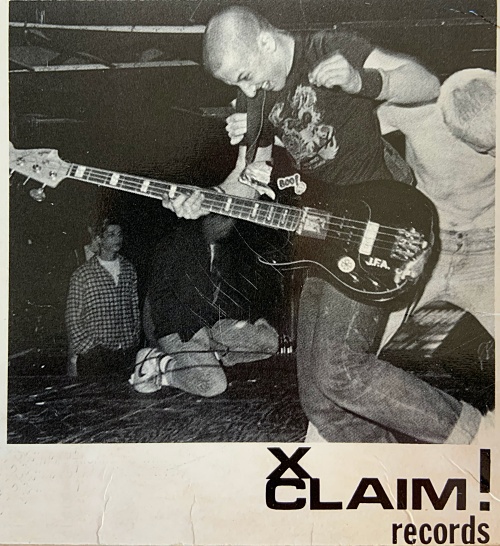
Everybody used Precisions because of Dee Dee Ramone and Sid Vicious!
Yeah, and it’s interesting because I still ended up later with a couple early '70s white P’s [Precisions] with rosewood fretboards that weigh like 15 pounds and they’re not that great. I mean it’s a great rock bass sound but the Jazz necks just fit my hands better.
How did you end up meeting the guys from DYS and forming the band?
Dave Smalley and I got connected through an ad. I can’t remember which one of us put an ad up but it was an ad to put a hardcore band together. And we kind of met a little bit through the Boston Crew and he brought a drummer who was a horrible drummer and I ended up meeting a guitar player who was a very good guitar player but he ultimately wanted to be in Van Halen.
Those 4 people were the nucleus of DYS and then we ended up replacing the guitar player with a different guitar player, we ended up replacing the drummer with Dave Collins and then we replaced the guitar player who replaced the first guitar player because he wasn’t straight edge and Al Barile suggested Andy Strachan to do it, who was also in the Boston Crew. So it was sort of through adjacency to hanging out with SSD really. It took a couple of incarnations to get to the Brotherhood incarnation.
So you and Dave knew from the beginning that you wanted it to be a straight edge hardcore band?
Yes.
How did songwriting work with DYS? The lyric sheet only mentions who wrote the lyrics.
Early on I would say Dave wrote 90% of everything, music and lyrics and occasionally I’d do some music or I’d do some lyrics. Then five piece later phase DYS the band wrote most of the music and Dave wrote all the lyrics. Then in re-formed DYS, and this is interesting and this is rare for a singer thing Dave wrote 90% of the music and I wrote 90% of the lyrics. We sort of flopped it around.
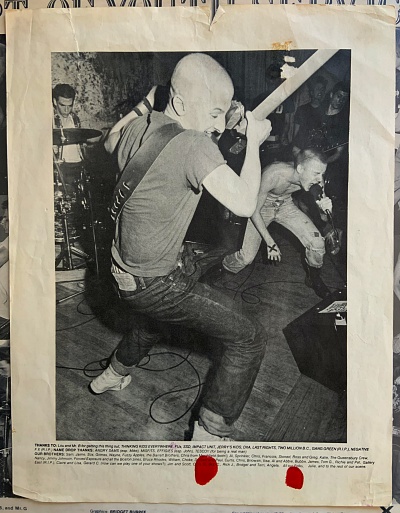
Who/what is “Open Up” about, I know Dave wrote the words but still…? What was that a reaction to, was it a specific person?
Dave wrote the whole thing. I remember he sort of plunked it out on my bass, he flipped it upside down. It might’ve been a specific person or a specific incident but it was sort of like how narrow minded any scene can be right? I think that song has been written 50 times about 50 different over reactions. I think at that point it was probably written about Dave’s reaction to sort of having more of a punk image at a time when it was about being more Hardcore and being hard.
That song could’ve been written later about being into rock n’ roll when everybody else is into jardcore. But Dave had a big [Government Issue singer] John Stabb influence so at a time when most of the rest of Boston was into being like hard, you know like hard 1.0 and Dave’s doing more of a hippie punk thing like a John Stabb hippie punk thing and probably getting a bunch of shit about that.
That’s interesting, I never would’ve known that, I love Government Issue so that’s really cool but I didn’t know that. Especially because you guys, along with SSD obviously kind of pioneered the whole shaved head, rolled up jeans collegiate straight edge hardcore guy look.
It’s so funny because in such a short time there were so many incarnations. You can find some early pictures where Dave’s doing a full-on John Stabb with the spiky GBH hair and sort of like hippie stripey pants but I think that was sort of short lived and I think sort of through osmosis the 12 or 14 of us in the Boston Crew sort of ended up in that same place.
Like kids today all wearing the same Supreme shirt. We found this place in south Boston that sold these special boots that only cops could buy that were like combat boots with a steel toe but they zipped up on the side. Then when somebody got them it’s like, “Oh dude where did you get those? We all have to get ‘em!” You know, it’s just our version of like Air Jordan 1s or like everyone’s got the same model of Dunks.
You guys recorded the Brotherhood record with the aforementioned Lou Giordano. Do you have any special memories from those sessions?
I do! I think we were sort of a little bit further along and Lou was a little bit further along. The thing I remember we struggled with with that record and I’m still not 100% happy with is struggling with the guitar sound. I’m not thrilled with the guitar sound on that record. And again, I still think we’re just trying to figure out how to be a band and how to write songs and when we ended up reuniting I ended up sort of driving a sort of what I call minor plastic surgery on those songs. I sort of go back and I go, “Verse, chorus, verse, chorus DONE?? We thought that was a song?" [laughs].
So now when we play one of those songs it’s sort of like, verse, chorus, verse, chorus, changeup, chorus, chorus, out. To try and make them more like traditional song structures. Lou was great at getting good sounds but he wasn’t Mutt Lange [Def Leppard, Foreigner producer].
There wasn’t any getting involved with the arrangements and the songwriting and, try this and try that. He very much came at it from a working man’s engineer POV. Which isn’t bad but when we were making the second record there was a lot more producer input on the song craft. But you sort of go back and I think we just sort of trying to get through it. We just weren’t thinking about that kind of stuff back then.
I’m sure you’ve heard the Agnostic Front Victim In Pain album.
Yeah.
That’s got a really similar guitar sound to the Brotherhood LP. And both records end with sort of a weird style of song: you guys have “Escape” and they have “With Time."
Yeah, I never thought about that parallel though.
What did your parents think of DYS and did they ever come to any shows?
My dad was super into it. I mean, I think my parents were torn on this. My parents were sort of typical Massachusetts over-educated intellectuals, you know, progressives, sort of ex-hippies. I think they were torn, they wanted to teach us to be self expressive and creative and all that stuff but there was a lot of the traditional wiring of like, Well what about your education and what about your what about your higher education and your graduate degrees.
They had, weirdly, what I would call a hypocritical careerist mentality but an anti capitalist careerist mentality. Like getting a PHD was super important. Like, if you said you wanted a PHD you got a pat on the head and if you said you wanted to make a million dollars you sort of got scorned at. So they were on one hand supportive and on then other hand it was like, your grades are slipping and the school’s calling and you’re not gong to school and you’re telling them you can’t go to school because you have to go play three shows in Ohio or whatever.
So there was some tension there. And then sort of being rebellious, sort of like if you were being rebellious against your parents from the '50s you’d be like, I’m doing drugs and I’m growing my hair and if you were rebelling against parents who grew up in the summer of love you’re like, I’m not doing drugs, you’re fucking weak, I’m shaving my head [laughs].
Did DYS ever actually tour back then?
Well, I don’t think anybody really toured back then, well some bands did, Black Flag really toured but I don’t think any of the Boston bands really toured. The irony is we ended up doing then what even the most successful hardcore bands do now. You go out and do little stints. You go out and do 5 or 10 shows and you come home. We never did anything crazy like SSD. Like Al talks about, “We drove all the way across the country and we didn’t play a single show and we played three shows in California and came home!” [laughs].
At that time, you probably couldn’t stop every day all across the country (and do a show), there weren’t enough hardcore venues right? But you could’ve stopped in some places! We didn’t do any of that crazy stuff but we’d do like, Well we’re driving south so we’ll do New York and I remember runs where we’d do like Virginia, DC, Maryland, and Pennsylvania and New York then home. I remember the Smalleys lived in Virginia so we’d go and sleep in their basement after every one of those shows except for New York.
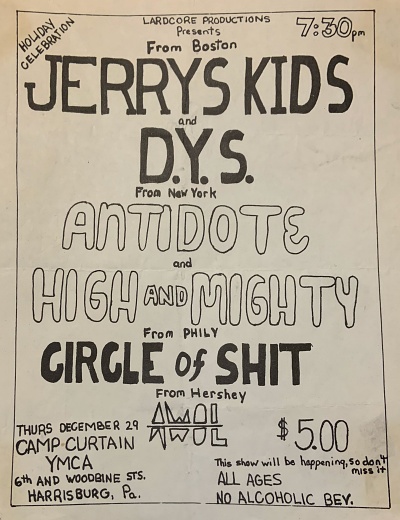
I saw you guys in the '80s at CBGBs with the F.U.’s and Reagan Youth. What was your take on the so called Boston/New York City rivalry?
The difference is, we were all just naive suburban kids. Most of us lived at home and never had to worry about what you were gonna eat or where you were gonna eat. I remember driving into New York for the first time as a teenager and there were all these burnt-out cars on the Cross-Bronx Expressway and just being like, eyes open and, “WHAAAT??”
Back then in the Lower East Side, cops didn’t go below 14th St. I remember walking into a bodega and you’d feel like something was off but you couldn’t quite place your finger on it and you’re like, Wait a minute, everything in here is covered in dust! Like it’s never been touched. And then there’s a little speakeasy window in the back of it and it’s like, Ooooh, this is actually drug dealing! Nobody’s actually selling anything in this bodega except for drugs! I remember being like this saucer-eyed suburban kid, you know, like, Whhaaatt??
The rivalry sort of happened over time. There was probably no rivalry the first few shows because the scene was so small and there weren’t that many bands and everybody would sort of band together. I think part of it was the innate background differences of all of us. It was just interesting, like the New York kids, they talk about squats and all that stuff, that came much later to Boston. I think there’s a reason the Boston scene gelled with the DC scene right away and didn’t gel with the New York scene, we were just from much similar backgrounds.
At the end of the day, from a socio-economic standpoint my family probably has more in common with the Bakers [Brian Baker of Minor Threat, Bad Religion] than like the Josephs [John Joseph of Cro-Mags]. I didn’t grow up in foster care or youth detention centers. I think there was just a bigger cultural divide that got in the way at some point. Then, I think part of it was our fault. There was just sort of that personality, like Al [Barile], “Everywhere we go we go big!” and some of that was just misunderstood.
Things that sound so stupid in hindsight and were intended to be provocative but weren’t intended to be aggressive. What I mean by that is, New York sort of invented circle pits and we’d go down there and be like, “Fuck those circle pits, man!” and we’d all just like decide that ten of us are just gonna go in the other direction and break up that circle pit. To be provocative but I can see how it was sort of viewed in a different mentality. Or like [Slapshot singer] Choke’s infamous straight edge chant right on the stage of Irving Plaza. Absolutely meant to be provocative, meant to be sort of thumb in the eye but not necessarily meant to be aggressive.
So there was a lot of sort of Boston trolling posturing kind of put together with this cultural divide. We ended up having more in common with the New Jersey kids. Sort of like a suburban scene versus an urban scene and then it just sort of grew into a life of its own and got bigger than it ever was intended and it sort of happened at a time that the (hardcore) world started splintering into crews and gangs.
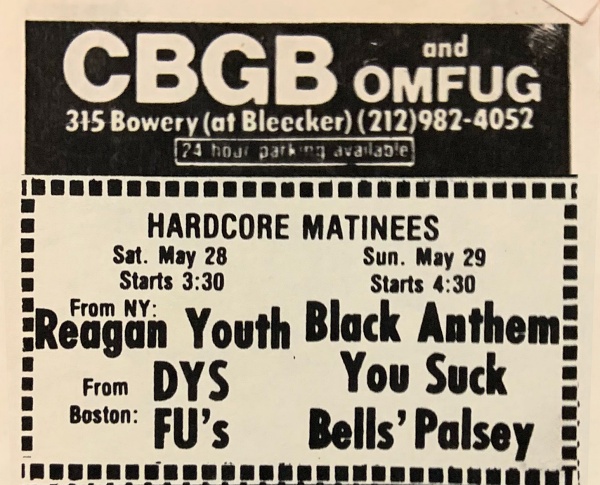
You mentioned New Jersey, I know DYS played a couple shows with the Misfits, were you guys friends with them?
I wouldn’t say we were friends with the Misfits but we knew the Misfits. The scene was small enough and I remember we played a show in New Jersey and Glenn came to the show. He was living in his parent’s basement at the time so after the show were hanging out in the in the Danzig family suburban basement in Lodi. Hanging out in the Danzig family’s basement in Lodi, NJ was a lot more familiar to us, it’s like hanging out in the Barile’s basement in Lynne, MA. It’s not the same as hanging out at a squat on A and 1st.
Right, I hear ya. Did you meet Danzig’s mom?
I think it was late, I think she was asleep.
Oh ok, I’ve heard stories of people going there and Danzig’s mom trying to feed everybody and him getting mad at her about it.
Yeah no, to me that kind of experience would be more like Al Barile’s mom. Like I’d go to the Barile’s house, SSD used to practice in the Barile’s basement and seeing Al Barile’s mom watching TV every time we went in and out.
What do you remember about this December ’82 show with you guys and the F.U.’s and the Misfits?
So, what I remember about that was learning how much like KISS the Misfits were. Having seen them show up and they’d always show up super early and Jerry and Doyle had some money. I remember they toured uniquely then, they didn’t tour in a van, at that time they were literally touring in an O.J. Simpson-sized Bronco towing like a real trailer because they had a massive backline.
For a punk band they had the biggest backline on Earth. I think they had like 6 or 12 cabinets or some ridiculous number. And showing up like super bro-ing. Like khakis, flannel shirts, Devillocks sort of flipped back so you can’t see them, no makeup. But they were like KISS, at some point they’d disappear so nobody but the other bands ever saw them like that and then they’d appear as the Misfits. I realized what a KISS like operation it was.
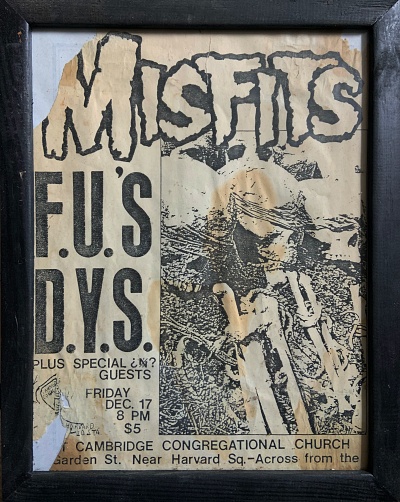
Are you in the "Braineaters" video that was shot in Boston (lots of Boston jardcore luminaries are in it)? Did you know the place it was filmed in (Durgin-Park) closed in 2019? And I heard it was real guts they used.
I’m not. I can’t remember why I missed that one. I’m sure it was something ridiculous like the last bus home was before they shot it or something. Yup it was Durbin-Park in Faneuil Hall. I’m sure somebody just went to the market where you buy that crap.
Brotherhood came out on Xclaim! What was the story with that label? I notice you guys had your own address listed and Al SSD had his on the SSD records etc. Was it an actual label or did Al just tell whichever bands he liked they could use it or something like that?
It wasn’t really a label. It was almost like a seal of approval. You’d have to ask for permission, it’s almost like licensing. You’d have to ask for permission to use the mark. Obviously we weren’t using language like that but Al (Barile) had to sort of believe the record was reflective of Xclaim! and also there’d be, you’d get some advice. Like, we all got our sleeves printed at the same place and we all used the same vendors.
Here’s who you use for mastering, heres who you use for pressing, here’s who you use for sleeves, so there were some steps cut out for you. I’m making it sound more sophisticated than it was, but some sort of pre-negotiated rights. Al would tell you, 2000 record covers are gonna cost you this, 2000 records are gonna cost you that, mastering is gonna cost you this, here are the phone numbers. You know, like you got that too?
It was almost like the deal he had with Dischord where Dischord, like Ian’s (Mackaye) got his seal of approval on that first SSD record but he had nothing to do with it. But he probably gave Al some vendors, you know? (SSD’s The Kids Will Have Their Say LP is Xclaim! #1/Dischord #7 1/2)
What was up with the King Arthur thing on the Brotherhood record, the Dicky Barret cover art kind of looks like knights or something and the intro to “Escape” with all the Lady of the Lake, King Arthur stuff?
I think you’re giving us way too much credit. I don’t think we thought it through thematically, I don’t think we ever tied those two things together, I think we were just trying to hang on and try to figure out how to do anything.
Honestly, I think the record cover is monks as a metaphor for brotherhood. Once we said the record is gonna be called Brotherhood, what are other brotherhoods? And I think like a lot of kids that ended up into punk, they were sort of into fantasy and Dungeons & Dragons and that sort of stuff so that ultimately is just a reflection of people’s tastes, or at least that song was a reflection of Dave’s tastes.
But the sleeve wasn’t tied to it, the sleeve was really just, What are visual manifestations of brotherhood? Monks! Monks are brotherhoods, ok!
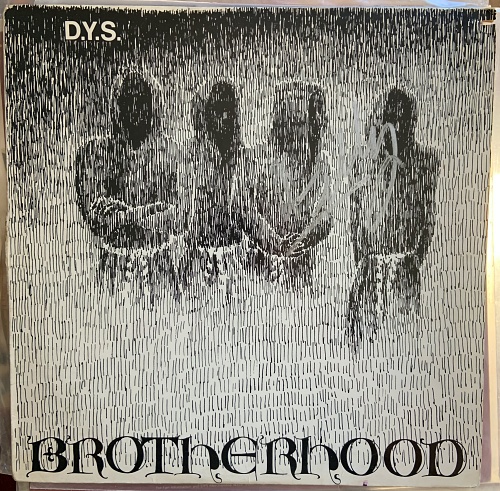
So is that what you told Dicky Barrett or did he come up with that?
He totally came up with it. We said to Dicky, “The record’s called Brotherhood, do you have any ideas?” There’s four monks, there were four of us, you know.
Did you guys think that whole thing through though, in terms of how monks are also celibate and stuff like that along with the brotherhood [laughs]?
No, we didn’t think any of that!
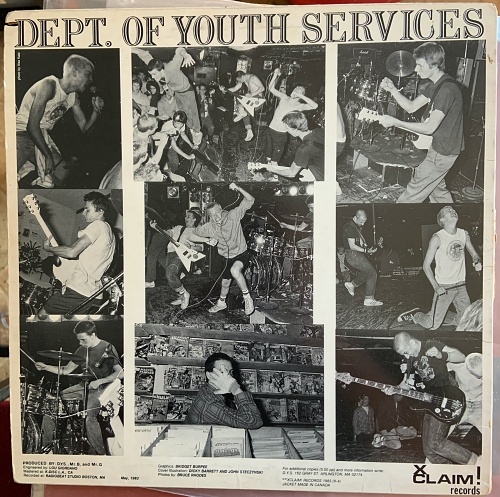
Were you stoked that you’re in one of the pics on the back of SSD’s Get It Away record?
I remember being psyched about it but I just sort of feel like if you go back and look at those records we’re all on each other’s records. I think we were more happy if we made the actual shoutout in somebody’s miles long Thanks list than if we had a photo on the record.
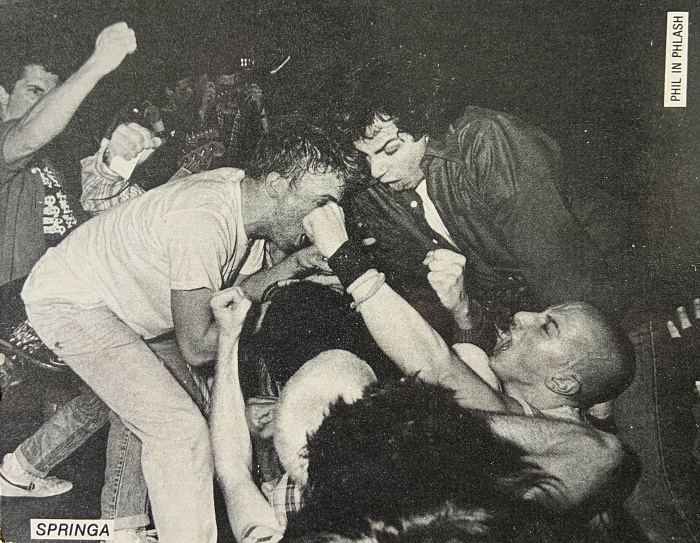
What was it about [porn actress] Seka and the Boston scene (from the infamous Boston Crew photo in Touch and Go zine)?
It was just a coincidence. I think we were all sort of very good trollers before the word existed. I think the photographer from that was just looking for iconic urban settings to take these pictures. So it was the same photo shoot that yielded us all by that big concrete X down by Boston City Hospital, so I don’t think the plan intentionally was porn, the plan intentionally was sort of, what urban places in Boston were sort of iconic, photogenic, stark and shocking.
So the Combat Zone was one of them. I think like any group of young dudes in bands in a car, like early porn, all that stuff… There’s a recording of all the top of the Boston Crew reading Penthouse Forum stories out loud, which if it ever came out we’d probably all be in trouble but it’s literally just us reading the stories from the magazine.
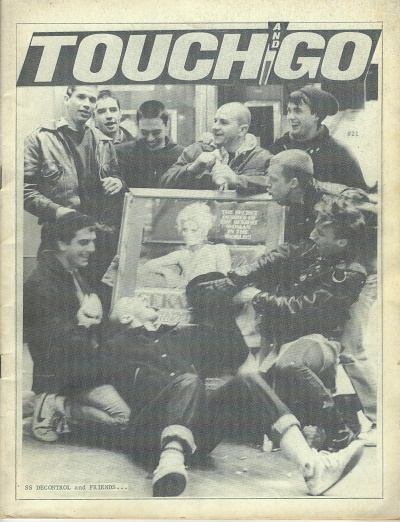
Wait, was Al doing it too?
No! I don’t think Al was doing it. But other people.
Did you skate back then (I notice the Santa Cruz and JFA stickers on your basses)?
Yeah, I was a marginal skater at best but I skated every day. I wasn’t great like Tony Perez or Jake Phelps but I skated every day for sure. Part of that sort of early California life, those images burned into my head, probably had a lot to do with why I ended up in LA. Like how early on I was like, you can’t be cooler than Joe Perry, I was like, there’s no place cooler than Los Angeles. You could skate year round!
The self-titled follow-up album to Brotherhood record came out on Modern Method. How’d that happen?
Everyone was trying to get a little careerist then and we’ve established the fact that Xclaim! wasn’t really a label. Doesn’t have distribution, doesn’t have promo. We’re all trying to make our reach a little bit bigger. We all think we’re doing music that’s a little bit more accessible. I don’t think there’s a band on earth that says they don’t wanna reach more people and I think if they do (say that) they’re lying.
In our own careerist way, Modern Method has distribution, Modern Method has marketing, Modern Method has PR. The same way the F.U.’s ended up on Caroline, right? [it was Enigma and Restless], And before Gang Green ended up on a major label we’re all sort of moving up the food chain. Even that last SSD record, didn’t Gerard Cosloy put that out on Homestead Records?
So even Al, and everyone at some point was looking at like, can the distribution and the promo get bigger? Can the reach get bigger? Those were the equivalent of modern pressing and distribution deals, we brought them finished records.
So you guys still own the DYS tapes and the masters?
You know, I would say this; bad intermediary deals were cut with Taang! Records along the way that we’re extracting ourselves from but the Modern Method guys were actually super straight shooters from a contractual standpoint. I still get This Is Boston, Not L.A. royalty checks on a regular basis.
Not like they’re big but I will say this: this many years later Modern Method cuts checks on a regular basis. If they decide to put out another 500 records on a different color vinyl, people get paid. Chris Wrenn at Bridge 9 never missed a royalty payment, never missed a statement date. Can’t say the same of Taang! Records.
You guys also added lead guitar player Rossano Luongo at that time, what inspired you the add a second guitarist? Was it because of Black Flag and SSD and Minor Threat, etc., added additional guitarists into their lineups, or maybe it was just Andy couldn’t play leads?
I think it’s like that same osmosis where we all ended up with the same pair of sneakers. You need to hear the possible, right? And once you hear the possible you’re like, Maybe we’d be better served by that. I think it’s a little different with us. Like, Al has been very honest that they added a second guitar player not for leads but because he didn’t trust himself to make it though 10 songs without the guitar dropping off. I’m not saying this to dis him, he has said this out loud. They (the SSD instagram page) made this super interesting post.
I think SSD does the best job of any of the legacy bands managing their social media with all these inside baseball stories that are great. Al talks about bringing on Francois [Lavesque, SSD second guitarist]. He’s like, I didn’t trust myself to do 10 songs without the guitar dropping out for long periods or being out of tune and I had to de-risk myself. He’s very honest about that. Francois was really brought in as a second guitar player who happened to play leads but he was not a lead guitar player.
Andy’s a rock sold rhythm guitar player, we didn’t have that problem at all. For us it was more like, Wow! Things sound thicker this way! And if I look back at my favorite bands pre-hardcore they were all two guitar bands. Like all of them. Or even if they weren’t they certainly recorded like two guitar bands. So for me it was sort of natural and osmosis and sort of hearing what’s possible.
I think we just sort of all influenced each other and heard those things at the same time. The F.U.’s bring in Steve Martin (Straw Dogs, Agnostic Front) and you know, it accelerates songwriting and to some degree it honestly felt like I was the Al, like I had more cover. I had more thickness of another guitar player on my side of the stage to pick up my dropping out. So if there were any shortcomings to cover for they were mine not Andy’s.
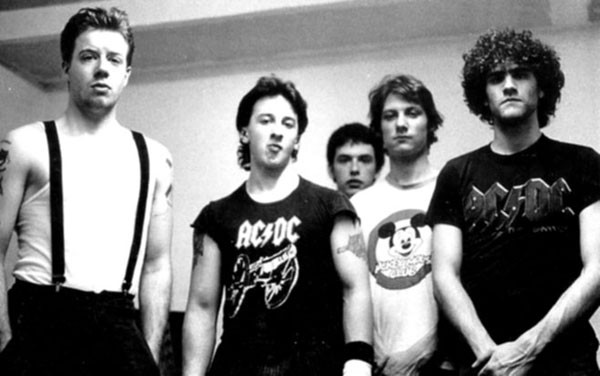
How do you feel about DYS having the distinction of writing and recording the first ever and possibly only hardcore ballad (the song “Closer Still) on that album?
[Laughs] It’s so funny because I never thought of it that way! At that point when we were writing those records and the records we were listening to, every record had at least one ballad so at that point the reference point for us is like Metallica and Iron Maiden and stuff like that so I think our whole reference point had shifted. At that point it was like, every record has to have one of those.
That’s pretty interesting because I didn’t know the influence of Metallica on you guys at that time but now that I know that I can totally see that.
It’s super interesting because everybody always says the whole Boston scene went in the same direction, going metal and I’ve had this conversation with Al. Like, they (SSD) ended up sort of doing hard rock boogie, like if you listen to their last record I think they’re mining Aerosmith meets AC/DC and I think we’re mining Iron Maiden Meets Metallica.
Oh for sure! You guys still have the hardcore/thrash beat on half the songs.
But even the rock stuff, I think we were mining metal more than rock. I think it was actually easier for us because if you’re coming out of being a hardcore band, and this goes back to that Brian Baker quote, mastering riffs is much harder than mastering feel. So, we only have to be tight whereas Al (and SSD) has to master, like you know how AC/DC makes your girlfriend or your wife’s hips shake in a way that Metallica doesn’t?
They have to mine that at that point, right? That’s a much harder thing, that’s a thing where, why does every girl even if they hate hard rock move their hips when they hear AC/DC? That’s a way harder thing to get right than, we’re doing like math metal. You just have to be tight.
Do you ever look back and think about how like you guys said in an interview then that you were no longer hardcore punk you were now hard rock or something and how SSD infamously declared hardcore dead, do you ever think that if you wouldn’t have done that and just released those albums you could’ve retained your core audience and people might not have noticed the departure so much? Especially on the second DYS record where a lot of it’s actually still pretty hardcore stylistically, as I said.
I don’t know. I think, and remember we were already playing some of those songs live, I think we were intentionally trying to fight off the shackles of limitations. I don’t think that’s firing the first shot of alienation of the first audience, I think that’s the pushback. I think that’s the, You’re not letting us be who we wanna be, you’re telling us to be this, so if we have to this to be hardcore then we’re not hardcore anymore.
I don’t think Black Flag ever declared they’re not hardcore anymore or maybe they did but they’re playing like nine minute dirges and Henry’s getting punched in the face and burned with cigarette lighters.
Right, I hear ya, but I think you hit on a pretty important point, Black Flag never really said anything about it they just started doing it and they stopped shaving their heads.
But they got the backlash still! Henry took the physical brunt of it. You talk to Henry about why he was an asshole then and why he always in fights and he’s like, People are literally burning my legs with cigarette lighters while I’m trying to sing! It ended up being sort of a two way street but any of those genre things, there’s a lot of limitations to what you can do and I think we were chafing at the limitations.
We were chafing at the limitations of what we could do musically, we were chafing at the limitations of what venues we could play, we were charging at the audience’s expectation. It’s not uncommon in the history of music. There’s a whole a period where you can go back and read the super interesting Pete Townsend interviews where’s he’s like angry at his audience. Angry with them!
Obviously. all the original hardcore bands went through that back then. Like you guys, SSD, Necros and then you have bands like Fugazi, you either went metal or you went weird back then.
Yeah. I would argue that Gang Green changed the least musically and changed the most image wise. The music didn’t really change but all the sudden there they are with like, Anthrax’s 30-cab backline and flipped up Suicidal hats and the shorts.
Who’s idea was it to use the Bruegel painting for the cover art on the second DYS album, and did you guys know that it was also used on a Black Sabbath Greatest Hits album?
No, there was no internet, we didn’t know any of that stuff! The same way that Al is like, I had no idea that was a Judas Priest album cover [the How We Rock cover is similar to Point of Entry]! There was nothing to fucking Google then.
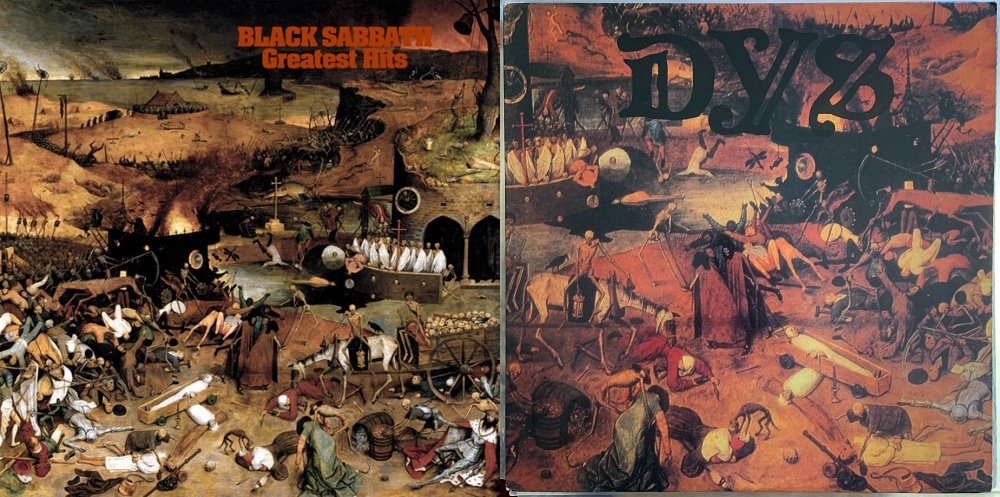
According to the credits on the back cover it looks like you guys actually had official permission to use that image?
No, we lied! it was made up, a complete fabrication. And I think I’ve learned that that’s actually in the public domain. We decided to put that on there last minute in case anyone saw it and was like, We should tell on them!
How did Chris Foley from SSD end up drumming for DYS?
At the very end, SSD had broken up, we’re trying to do this metal thing and Dave Collins just wants to do other things with his life. I don’t think he was super into the direction we were going musically. I think he thought it was less challenging than the hardcore stuff, like we were being too formulaic metal. I remember, musical genius is what made him an incredible drummer but it’s also part of what him difficult because he gets so bored, he was so good but like he’d never play the same fill at the same time and there was a lot of unpredictability, not out of lack of talent but out of too much talent.
I remember we were writing something and we were doing this very metal thing where I’m riding the open E in the intro of a song and he’s like, “Why do you wanna play just one note? Is that fun to you, just playing one note?” (laughs) And Chris Foley is this unbelievable talent who has just come out of doing what we wanna do and is available. I have a recording of our last show, our sort of major label showcase at the Paradise with Chris Foley and what is amazing to me is how much we completed the transformation.
Like, to your point about where it’s 25/75, metal to hardcore on that second record when we recorded it, to hear the versions of those songs and how Chris Foley has changed them and we’ve leaned into the rock even more, I almost wanna be like, Wow, we should’ve waited another 6 months to record that record! It would’ve been a better metal record. For better or worse we just became more fully who we were trying to be with Chris Foley.
Did you guys write any new songs that weren’t released at the end?
Yes. Which interestingly aren’t even metal. There’s a couple, there’s one song and I was just listening to the tape sitting with [xXx Zine, A&R executive] Mike Gitter and [musician: Triggerman, Winds of Promise, Trust Records co-founder] Joe Nelson, and I was like, Does that song have two intros and of them’s a minute and a half of acoustic guitar??
Did you record any of that in the studio?
No, we didn’t. We were just sort of workshopping them live by the time we broke up.
You didn’t use any of them for the re-formed DYS stuff?
No, because I think with the re-formed stuff we were just trying to figure out who we should be now. The thing I really pounded the table about when we re-formed was, and no offense the bands that do it, but I didn’t wanna just come out and be stuck in amber and play the same 10 songs we played in the '80s and we had an added problem that some of those bands don’t have which is, how do you gel the first record with the second record?
If you’d have asked the audience the audience would’ve wanted just the first record and that’s literally not enough material to play a live set. I mean, what’re we gonna play, 18-minute sets? And if we have to go to Europe and headline, they expect you to play an hour as a headlining hardcore band, and we’ve got like 18 minutes of music if we just play the first record.
And B, I don’t wanna play just the first record. Half of those songs if I never played them again in my life, I wouldn’t. I wanted to play the better songs off the second record and so when we first re-formed I really put a lot of work behind, how can you really bring those songs together. We intentionally sped up the second record songs, we intentionally slowed down the first record songs, we went to traditional tuning on everything so half of it isn’t in E and half of it isn’t in D sharp, we had Dave sing the second record songs more like how he sings the first record songs, which is more like how we originally played them live and we just tried to bring them together a little bit more.
Then, when it came time to record, it was sort of like, "Well, is the hardcore DYS gonna record or is the heavy Metal DYS gonna record?" My answer was no, the 2011 DYS is gonna record. What is 2011 DYS like? What are the influences of the people in this band now? I was just like, I don’t wanna live up to any prior expectations, pretend this is brand new thing. What do we like? What do we listen to? What excites us? Pretend there was no other band, what would we be writing now? I think it’s hard rock with metal and hardcore influences, if you ask me. Or with punk influences.
I think if you ask Brooklyn Vegan it’s dad rock [laughs] as they famously said but it is honest to who those 5 people were at that moment in time and what we wanted to do with zero attempt, for better or worse with trying to please anybody or be anything. Every old musician says this but sonically I’m the most proud of the, performance wise I’m the most proud of them, production wise, the whole thing, I’m the proudest of them. Those are the records and the songs that I wish I could’ve done that way back in the day.
Our drummer, Al Pahanish, had toured the world opening for Metallica in Powerman 5000 and Franz [Stahl, also in the band Scream] had done his thing with stints in Wool and the Foo Fighters and being a sideman in Japan, and Adam Porris is a Berkeley grad. Dave’s got this weight to his voice after singing for 20 years and I think that music reflects all that. You can love it, you can hate it, it’s dad rock, it’s not dad rock, this song sounds too much like Dropkick Murphys, but I think it’s a super-honest reflection of who we were at that moment.
Were you guys not interested in approaching any of the other original members for the reunion?
Well, the first show in Revere we had Ross [Luongo] do it so we had three of the original members of the 5 piece. He was also doing Jerry’s Kids at the time and he was traveling to Europe with his job for Adidas, Ross has a very serious Adidas career, he’s got a limited amount of time. He had made a commitment to Jerry’s Kids long before DYS. Andy’s got his life as a Sikh, I believe he was living in India at the time.
We’ve talked about, whenever we’re ever in the same city he’s got an open invitation to come up on stage with us any time and play any song he wants. Dave Collins, nobody could get in contact with him. We put some feelers out through mutual people and we didn’t hear anything back so he wasn’t interested.
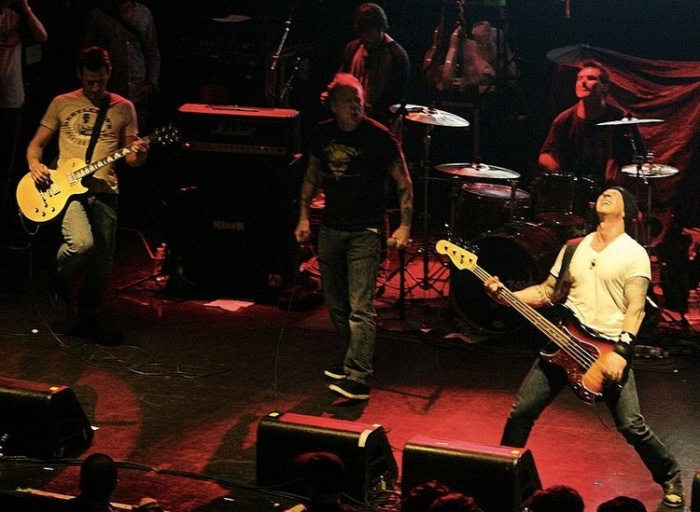
If I’m not mistaken, he wasn’t listed on the Taang! reissues of the DYS stuff right?
I think that might’ve been at his request to Curtis [Casella, Taang! Records owner].
What happened with the DYS audition for Elektra Records?
So, the feedback we got, and you never know really what the whole story is, the confusion was, the feedback we got was, “Alright, you’re a heavy metal band that looks like a hardcore band. So here’s the deal, Can you guys wear leather pants, more studded bracelets? Can you lean into that and if you can do that and take out some of the punk rock?”
They really wanted us to be more of a metal band. Like, you’re 80% of the way there you gotta move the image, you gotta double down or you gotta stay being a punk band, and as careerist as we were at that point it just felt disingenuous. And I also think the expectations were getting to the point where we didn’t have the ability to pull it off.
I remember the last straw was we were supposed to go do some shows in Canada and we were supposed to shoot our first “real music video” and you remember what a big deal it was to actually get a music video back then. Now your kids are making stuff on Tik Tok that look better than videos did back then. For whatever reason, you know, we’re 18 years old, 19 years old and we just couldn’t get it together to pull it off and it was sort of the last disappointment straw in a row.
At the same time there’s some internal chafing about how much are we willing to change, how much were we willing to morph to be what the industry wants us to be. If you think about that, look punk and sound metal, that wasn’t ok for another six or seven years after that. It got ok in the early '90s but it wasn’t ok then.

I guess Corrosion of Conformity sort of did it but maybe they didn’t really look punk anymore.
They didn’t look punk they looked like a bunch of southern rock stoners. I think Elektra wanted us to look a little more like Metallica. More of that Metal Up Your Ass kind of image.
Well you guys were into Metallica at the time…
We were but I don’t think anybody wanted to feel like they were wearing a costume.
I hear ya. How did DYS break up, that was just it, you guys just sort of said, fuck it or was there any final straw?
We had a meeting, right? And it was like, Hey there’s some differences of opinion and hey we kind of screwed some things up, like you know, are we done here? And Dave went on and took a break from music and got his master’s degree and then did Dag Nasty. A whole bunch of things sort of coming to a head, Dave was graduating from BC [Boston College], is he gonna stay in Boston?
You then joined Choke in Slapshot. How’d that happen?
It was under a year later. You know that life you have as a musician is all justifiable when you’re a musician and the second you’re not a musician you’re like, this life sucks! I missed the camaraderie of being in a band. It’s like being in a motorcycle gang or being on a sports team.
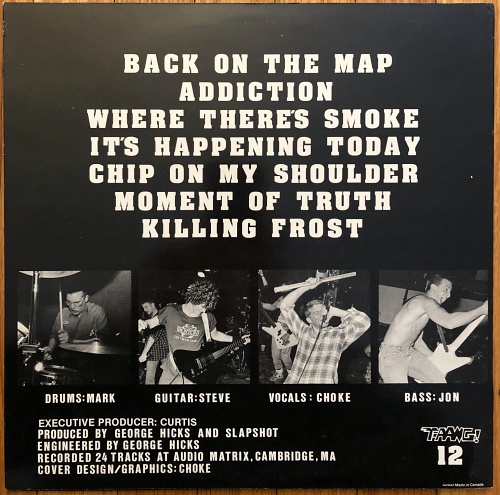
Did you guys discuss how it was gonna be old-school hardcore again or what?
Choke had that vision fully formed. If Dave and I were sort of the drivers of what DYS was and where it went, I was a side person (in Slapshot). Choke had a Vince Mcmahon laser focus on what that band was supposed to be.
How come you only lasted one album?
I did one album and we were probably halfway into writing the second one and then I started going to night school and I decided that was more important, I had to think of my life beyond music and I went to Amherst and then you’ve go the distance of being across the state and then it was like, well we gotta play these shows and I’ve got midterms so it just wasn’t working.
Is DYS planning on any more shows or records?
We were supposed to go out in the Fall of 2020. We were doing what we’ve been doing for the last few years, the first couple years (of the reunion) we were doing like 30 shows a year, 10 of them were in Europe and then we were doing fly ins.
Like a low-end punk rock version of what my friend Mark McGrath does with Sugar Ray, you fly into some place on a Thursday, do like 3 or 4 shows in a blast radius and fly home. We’ve been talking about doing that stuff this year but it looks most of that stuff will get pushed into 2022.
What’s your life like lately?
I’ve been a marketer and a businessman and an investor for like the last 20 years. I’ve just been trying to build a career outside of music and my wife and I adopted a teeny baby boy 4 years ago and that’s been a big life-changer and taken up a lot of my spare time. If I work 60 hours a week, which I’ve always done, then it’s like I’m really choosing between any kind of quality time with my son versus going to play a show.
Let me ask you sort of a funny question. I’ve noticed you and Al Barile sort of go at it with each other a little bit on Facebook…
Yes, all the time!
But you guys are friends, right?
Oh totally! We have a whole back channel direct message thing going on all the time. We’re both two people with big personalities and strong opinions but I can’t name the number of interviews I’ve done where I say 80% of everything I learned to do back then I learned from him and there wouldn’t have been a roadmap for what to do with DYS without what he did and he was always kind with his time and his council and his resources so he’s got my lifelong respect and friendship and you know, we’re just two strong willed people battling it out and trolling each other.
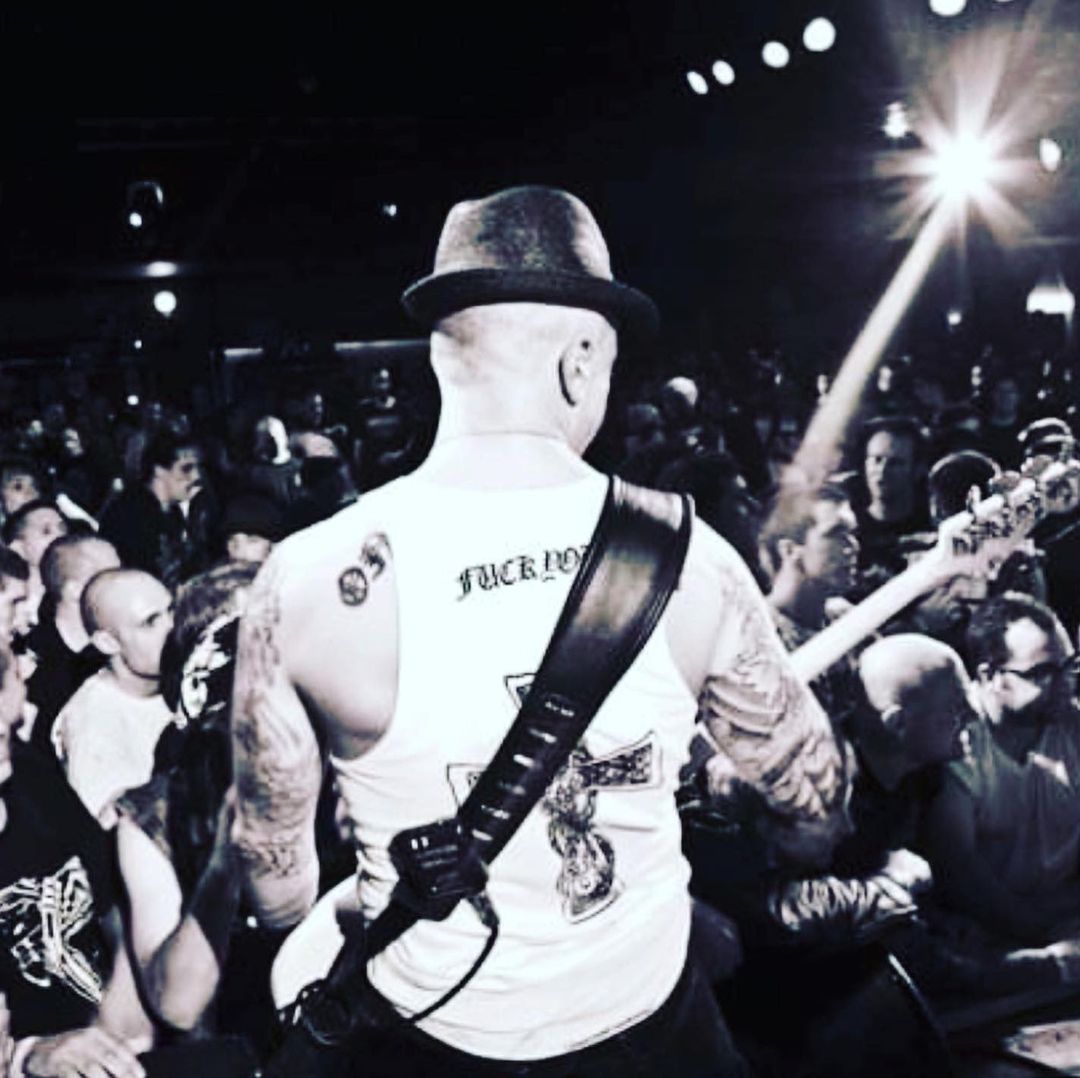
Anything you wanna add?
No, I think this was awesome!
Thanks!
***
DYS on social media: Facebook | Instagram
***
Help Support What No Echo Does via Patreon:
***
Tagged: a hardcore conversation, dys, slapshot

